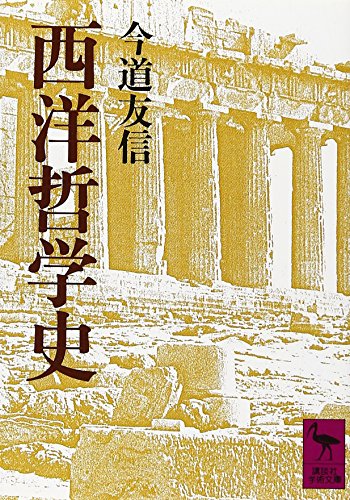4 0 0 0 OA プラトンにおけるイデアと一般者
- 著者
- 今道 友信
- 出版者
- 日本西洋古典学会
- 雑誌
- 西洋古典學研究 (ISSN:04479114)
- 巻号頁・発行日
- vol.12, pp.40-55, 1964-03-31
1) Almost all the so-called modern interpretations of Plato's idea tell us that the idea is nothing other than a general concept It is true that Plato endeavours to find out the general concept for the benefit of science against subjective opinion (δοξα), but it does not imply that his sight does not reach the transcendent, which is the real object for philosophy Through philological analysis and philosophical reconstruction of Plato's original texts, the author concludes, in opposition to the currently accepted interpretation, that Plato makes an effort to discriminate ειδοζ as the universal, and ιδεα as the transcendent, the transcendent being often modified by the phrase αυτο το Such an inclination in the use of words is clearly perceptible both in Plato's dialogues after Phaedo and in the various texts of his successors, Aristotle, Theophrastus and later Neo-Platomsts 2) The necessary condition of true judgement is that the predicate is not subjective but objective, not individual but general Such generality depends on the nature of the thing which is intentionally designated by the subject-term in question, namely, the immanent form of the thing, that is to say ειδοζ which itself consists in genus-species-relation, and which, therefore, is determined in definition So the ειδοζ is no doubt μαλιστα οργανον for the science in general whose construction is a system of definition 3) But there is something which may not be comprehended by definition For Socrates can never succeed in dialogues in finding out the perfect definition for the real value such as beauty, or virtue such as justice (Meno 100 b 7 etc) We realize here that there is something which is super-ειδοζ, trans-ειδοζ, "au dela de" ειδοζ, επεκεινα τηζ ουσιζ, that is to say ιδεα 4) Through strictly philosophical reflexion, which may not be summarized here, the author enumerates the following kinds of ιδεα a) The ground or criterion of thought and judgement, such as το ισον (equality), το μεγα και μικρον (great and small) (Phaedo 75 c 1-2, etc) b) Ideal form of natural beings, referred to in Timaeus (Tim 39 e 7-9, etc) c) The highest prime cause of cosmological dynamics (Phileb 27 b 9-cl, etc) d) The real value such as Beauty, Good, One, Justice etc e) Some artefacta (artificial things) which have essential relation to βιοζ θεωρητικοζ or βιοζ θειοζ (Arist Met 1070 a 18-19, Resp 596 b 3-4, Soph 265 e 3-4, Phaedo 62 b 7, etc ) But all such kinds of idea are condenced in, or included by, that mentioned in c) above, namely, the real transcendent that in nature is God 5) The idea of the Good ιδεα του αγαθου as αρχη will, according to Plato's own text, be apprehended only after the dialectical speculation through ειδοζ (Resp 510) This transcendentality of idea is confirmed by the analysis of Plato's VIIth letter (VII Epist 342 a 8-e 2)
2 0 0 0 OA 霊性と芸術 : キリスト教的美学の視点から
- 著者
- 今道 友信
- 出版者
- 青山学院女子短期大学
- 雑誌
- 青山学院女子短期大学総合文化研究所年報 (ISSN:09195939)
- 巻号頁・発行日
- vol.7, pp.3-15, 1999-12-25
1 0 0 0 西田先生と私:運命的緊張の永続
- 著者
- 今道 友信
- 出版者
- 西田哲学会
- 雑誌
- 西田哲学会年報 (ISSN:21881995)
- 巻号頁・発行日
- vol.8, pp.20-30, 2011
1 0 0 0 人間の手は毒を滴らせる (芸術の毒杯<特集>)
- 著者
- 今道 友信
- 出版者
- 新潮社
- 雑誌
- 芸術新潮 (ISSN:04351657)
- 巻号頁・発行日
- vol.34, no.8, pp.p42-43, 1983-08
1 0 0 0 OA 西田先生と私 運命的緊張の永続
- 著者
- 今道 友信
- 出版者
- 西田哲学会
- 雑誌
- 西田哲学会年報 (ISSN:21881995)
- 巻号頁・発行日
- vol.8, pp.20-30, 2011 (Released:2020-03-23)
1 0 0 0 OA 思索の主体は誰か : プラトンの知識論について
- 著者
- 今道 友信
- 出版者
- 日本西洋古典学会
- 雑誌
- 西洋古典學研究 (ISSN:04479114)
- 巻号頁・発行日
- vol.19, pp.1-15, 1971-03-31
By quoting several Greek philosophers, the author tries to distinguish the judgement from the description. According to his opinion, the description is nothing other than the task of the eye and its act is the objective exactitude. The judgement is on the contrary the personal decision concerning internal responsibility, and its act is the truth. Many thinkers utilize their objective description about the external world for their judgement. But Plato concentrates on the judgement. Because his theory goes on the level of logos, which is the correlative of the reason, and not on the dimension of pragma, which is the object of the sense. His theory of ideas is not the inductive reference from sense-data, but from this theory as principle the lot of true propositions are deduced. (Interpretation of Phaidon) The subject of thinking in Plato is neither the sense nor the reason of human beings. The human reason does love the true thinking which is the business of God. The act of the human reason is to become the horizon for the thinking of God. Periagoge tes psyches (conversio animae) to the Being-itself is the principle for the homoiosis toi theoi. Because the service for God (latreia tou theou) is the most important task for us, we must know what God thinks and we must do as we know. This is the reason why the thought and deed can be one in Platonic system. (Interpretation of Apologia and Politeia)
- 著者
- 今道 友信
- 出版者
- 金子書房
- 雑誌
- 児童心理 (ISSN:0385826X)
- 巻号頁・発行日
- vol.67, no.13, pp.1054-1061, 2013-09
1 0 0 0 情報倫理
- 著者
- 今道 友信
- 出版者
- 国立研究開発法人 科学技術振興機構
- 雑誌
- 情報管理 (ISSN:00217298)
- 巻号頁・発行日
- vol.50, no.10, pp.649-657, 2008
情報倫理についてここでは主として以下の4項目について述べる。1) 日本では古来「情報」はどのように考えられていたか。それは主として初めはただの「知らせ」であったが次第に噂の対極にある「告知」とか「命令」「報告」といった公的権威のあるものとして考えられていた。それゆえ,語に重圧があった。2) 知識社会が情報社会化するにつれて,言語が機械化され,情報は情報機器を介して収集される知識と考えられ,当初は世界中で情報は一般市民にとって受信の対象であった。それが情報機器の普及とともに神話の「隠れ蓑」の実現のようになり,無責任な発信が多くなってきた。ここから,情報機器使用の倫理が情報倫理の新しい部門となってきた。3) 学術情報と情報社会の構造的非倫理性や情報学に関わる倫理の問題が挙げられている。4) 情報倫理に関する本質的考察として,その基礎的命題を論じつつ,エコエティカ(生圏倫理学)との関わりに触れ,情報倫理が空間倫理から時間倫理を,さらに音の倫理を意識させることになった由来などを展開しながら,情報倫理が文明文化の社会における他者意識の覚醒をもたらすこと,それも魂の世話としての哲学の一環であることを述べ,情報倫理の一つとしての否定工学の使命にも言及する。<br>




